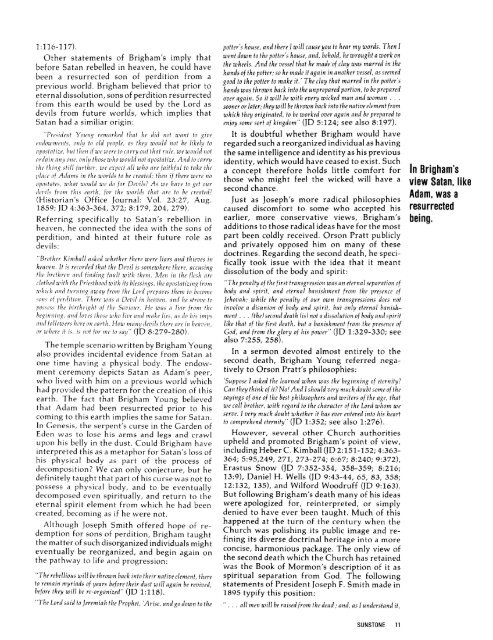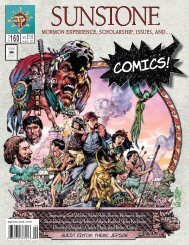Of Gods, Mortal, and Devils: Eternal Progression and the Second ...
Of Gods, Mortal, and Devils: Eternal Progression and the Second ...
Of Gods, Mortal, and Devils: Eternal Progression and the Second ...
You also want an ePaper? Increase the reach of your titles
YUMPU automatically turns print PDFs into web optimized ePapers that Google loves.
1:116-117).<br />
O<strong>the</strong>r statements of Brigham’s imply that<br />
before Satan rebelled in heaven, he could have<br />
been a resurrected son of perdition from a<br />
previous world. Brigham believed that prior to<br />
eternal dissolution, sons of perdition resurrected<br />
from this earth would be used by <strong>the</strong> Lord as<br />
devils from future worlds, which implies that<br />
Satan had a similiar origin:<br />
"President Young remarked that he did not want to give<br />
endowments, only to old people, as <strong>the</strong>y would not be likely to<br />
apostatize, but <strong>the</strong>n if we were to carry out that rule, we would not<br />
ordain any one, only those who would not apostatize. And to carry<br />
<strong>the</strong> thing still tur<strong>the</strong>r, we expect all who are &ithful to take <strong>the</strong><br />
place o( Adams in <strong>the</strong> worlds to be created; <strong>the</strong>n if <strong>the</strong>re were no<br />
apostates, what would we do for <strong>Devils</strong>? As we have to get our<br />
devils from this earth, for <strong>the</strong> worlds that are to be created?<br />
(Historian’s <strong>Of</strong>fice Journal: Vol. 23:27, Aug.<br />
1859; JD 4:363-364, 372; 8:179, 204, 279).<br />
Referring specifically to Satan’s rebellion in<br />
heaven, he connected <strong>the</strong> idea with <strong>the</strong> sons of<br />
perdition, <strong>and</strong> hinted at <strong>the</strong>ir future role as<br />
devils:<br />
"Bro<strong>the</strong>r Kimball asked whe<strong>the</strong>r <strong>the</strong>re were liars <strong>and</strong> thieves in<br />
heaven. It is recorded that <strong>the</strong> Devil is somewhere <strong>the</strong>re, accusing<br />
<strong>the</strong> brethren a~ld ~indin,,~ fault with <strong>the</strong>m. Men in <strong>the</strong> flesh are<br />
clo<strong>the</strong>d with <strong>the</strong> Priesthood with its blessings, <strong>the</strong> apostatizing front<br />
which <strong>and</strong> turnings, away from <strong>the</strong> Lord prepares <strong>the</strong>m to become<br />
sons o! perdition. l-here was a Devil in heaven, <strong>and</strong> he strove to<br />
possess <strong>the</strong> birthriy, ht of <strong>the</strong> Saviour. He was a liar front <strong>the</strong><br />
be~innin,~, <strong>and</strong> loves those who live <strong>and</strong> make lies, as do his intps<br />
<strong>and</strong> followers here on earth. How many devils <strong>the</strong>re are in heaven,<br />
or where it is, is not for me to say" (JD 8:279-280).<br />
The temple scenario written by Brigham Young<br />
also provides incidental evidence from Satan at<br />
one time having a physical body. The endowment<br />
ceremony depicts Satan as Adam’s peer,<br />
who lived with him on a previous world which<br />
had provided <strong>the</strong> pattern for <strong>the</strong> creation of this<br />
earth. The fact that Brigham Young believed<br />
that Adam had been resurrected prior to his<br />
coming to this earth implies <strong>the</strong> same for Satan.<br />
In Genesis, <strong>the</strong> serpent’s curse in <strong>the</strong> Garden of<br />
Eden was to lose his arms <strong>and</strong> legs <strong>and</strong> crawl<br />
upon his belly in <strong>the</strong> dust. Could Brigham have<br />
interpreted this as a metaphor for Satan’s loss of<br />
his physical body as part of <strong>the</strong> process of<br />
decomposition? We can only conjecture, but he<br />
definitely taught that part of his curse was not to<br />
possess a physical body, <strong>and</strong> to be eventually<br />
decomposed even spiritually, <strong>and</strong> return to <strong>the</strong><br />
eternal spirit element from which he had been<br />
created, becoming as if he were not.<br />
Although Joseph Smith offered hope of redemption<br />
for sons of perdition, Brigham taught<br />
<strong>the</strong> matter of such disorganized individuals might<br />
eventually be reorganized, <strong>and</strong> begin again on<br />
<strong>the</strong> pathway to life <strong>and</strong> progression:<br />
"The rebellious will be thrown back into <strong>the</strong>ir native element, <strong>the</strong>re<br />
to remain myriads of years before <strong>the</strong>ir dust will again be revived,<br />
before <strong>the</strong>y will be re-organized" (JD 1:118).<br />
"The Lord said to Jeremiah <strong>the</strong> Prophet, ’Arise, <strong>and</strong> go down to <strong>the</strong><br />
potter’s house, <strong>and</strong> <strong>the</strong>re J will cause you to hear my words. Then I<br />
went down to <strong>the</strong> potter’s house, <strong>and</strong>, behold, he wrought a work on<br />
<strong>the</strong> wheels. And <strong>the</strong> vessel that he madeof clay was marred in <strong>the</strong><br />
h<strong>and</strong>s of <strong>the</strong> potter; so he made it again in ano<strong>the</strong>r vessel, as seemed<br />
good to <strong>the</strong> potter to make it.’ The clay that marred in <strong>the</strong> potter’s<br />
h<strong>and</strong>s was thrown back into <strong>the</strong> unprepared portion, to be prepared<br />
over again. So it will be with every wicked man <strong>and</strong> woman . . .<br />
sooner or later; <strong>the</strong>y will be thrown back into <strong>the</strong> native element from<br />
which <strong>the</strong>y originated, to be worked over again <strong>and</strong> be prepared to<br />
enioy some sort of kingdom" (JD 5:124; see also 8:197).<br />
It is doubtful whe<strong>the</strong>r Brigham would have<br />
regarded such a reorganized individual as having<br />
<strong>the</strong> same intelligence <strong>and</strong> identity as his previous<br />
identity, which would have ceased to exist. Such<br />
a concept <strong>the</strong>refore holds little comfort for<br />
those who might feel <strong>the</strong> wicked., will have a<br />
second chance.<br />
Just as Joseph’s more radical philosophies<br />
caused discomfort to some who accepted his<br />
earlier, more conservative views, Brigham’s<br />
additions to those radical ideas have for <strong>the</strong> most<br />
part been coldly received. Orson Pratt publicly<br />
<strong>and</strong> privately opposed him on many of <strong>the</strong>se<br />
doctrines. Regarding <strong>the</strong> second death, he specifically<br />
took issue with <strong>the</strong> idea that it meant<br />
dissolution of <strong>the</strong> body <strong>and</strong> spirit:<br />
"The penalty of <strong>the</strong> first transgression was an eternal separation of<br />
body <strong>and</strong> spirit, <strong>and</strong> eternal banishment front <strong>the</strong> presence of<br />
Jehovah; while <strong>the</strong> penalty of our own transgressions does not<br />
involve a disunion of body <strong>and</strong> spirit, but only eternal banid~ment<br />
. . . (<strong>the</strong>) second death (is) not a dissolution of body <strong>and</strong> spirit<br />
like that of <strong>the</strong> first death, but a banishment from <strong>the</strong> presence of<br />
God, <strong>and</strong> from <strong>the</strong> glory of his power" (JD 1:329-330; see<br />
also 7:255, 258).<br />
In a sermon devoted almost entirely to <strong>the</strong><br />
second death, Brigham Young referred negatively<br />
to Orson Pratt’s philosophies:<br />
’Suppose I asked <strong>the</strong> learned when was <strong>the</strong> beginning of eternity?<br />
Can <strong>the</strong>y think of it? No t. And I should very much doubt some of <strong>the</strong><br />
sayings of one of <strong>the</strong> best philosophers <strong>and</strong> writers of <strong>the</strong> age, that<br />
we call bro<strong>the</strong>r, with regard to <strong>the</strong> character of <strong>the</strong> Lord whom we<br />
serve. I very much doubt whe<strong>the</strong>r it has ever entered into his heart<br />
to comprehend eternity" (JD 1:352; see also 1:276).<br />
However, several o<strong>the</strong>r Church authorities<br />
upheld <strong>and</strong> promoted Brigham’s point of view,<br />
including Heber C. Kimball (JD 2:151-152; 4:363-<br />
364; 5:95,249, 271, 273-274; 6:67; 8:240; 9:372),<br />
Erastus Snow (JD 7:352-354, 358-359; 8:216;<br />
13:9), Daniel H. Wells (JD 9:43-44, 65, 83, 358;<br />
12:132, 135), <strong>and</strong> Wilford Woodruff (JD 9:163).<br />
But following Brigham’s death many of his ideas<br />
were apologized for, reinterpreted, or simply<br />
denied to have ever been taught. Much of this<br />
happened at <strong>the</strong> turn of <strong>the</strong> century when <strong>the</strong><br />
Church was polishing its public image <strong>and</strong> refining<br />
its diverse doctrinal heritage into a more<br />
concise, harmonious package. The only view of<br />
<strong>the</strong> second death which <strong>the</strong> Church has retained<br />
Was <strong>the</strong> Book of Mormon’s description of it as<br />
spiritual separation from God. The following<br />
statements of President Joseph F. Smith made in<br />
1895 typify this position:<br />
"... all men will be raised from <strong>the</strong> dead ; <strong>and</strong>, as I underst<strong>and</strong> it,<br />
SUNSTONE 11<br />
In Brigham’s<br />
view Satan, like<br />
Adam, was a<br />
resurrected<br />
being.
















